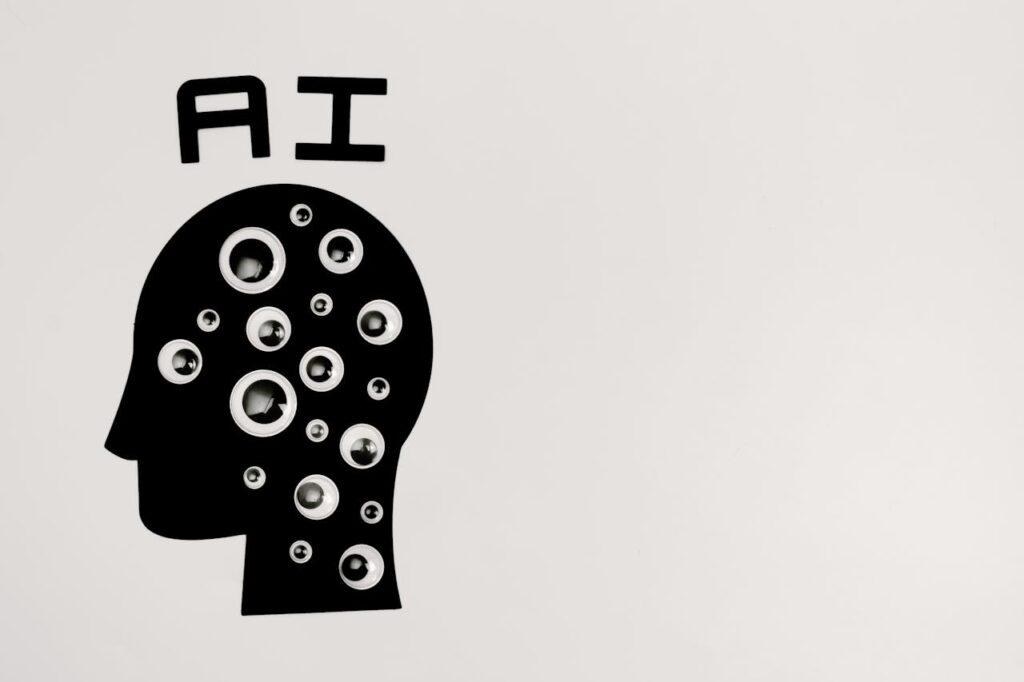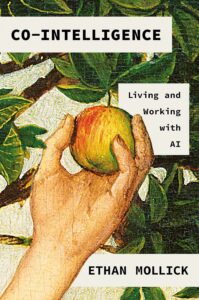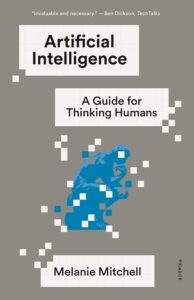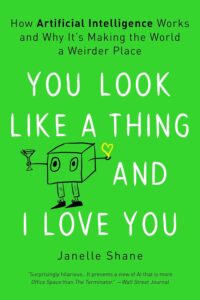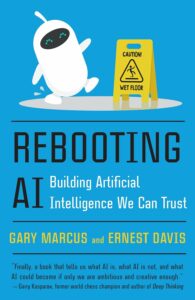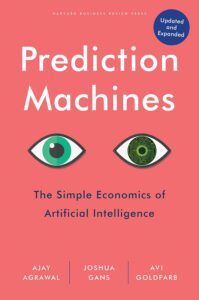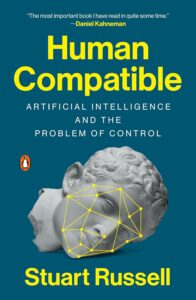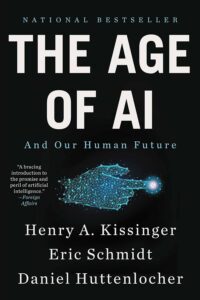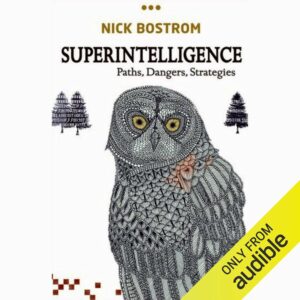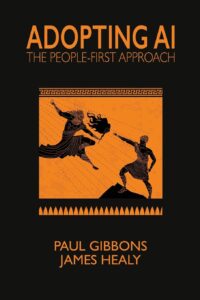Books to Understand AI – Master Generative AI and ChatGPT
Generative AI and ChatGPT have become popular tools for quickly creating content, automating tasks, and improving productivty. As artificial intelligence capabilities continue to evolve and improve, it’s useful for all of us to better understand these technologies and how they can be effectively used in our day to day lives. For those looking to improve their skills with generative AI and ChatGPT, here’s a curated list of some of the most popular and highly-rated AI books.
1. “Co-Intelligence: Living and Working with AI” by Ethan Mollick
Ethan Mollick’s “Co-Intelligence” explores how AI, particularly generative models like ChatGPT, can work alongside humans to enhance creativity, decision-making, and problem-solving. Mollick, a professor at the Wharton School of the University of Pennsylvania, combines academic research with practical applications, showing how businesses and individuals can leverage AI to support their capabilities rather than replace human intelligence.
Amazon Description:
Something new entered our world in November 2022 — the first general purpose AI that could pass for a human and do the kinds of creative, innovative work that only humans could do previously. Wharton professor Ethan Mollick immediately understood what ChatGPT meant: after millions of years on our own, humans had developed a kind of co-intelligence that could augment, or even replace, human thinking. Through his writing, speaking, and teaching, Mollick has become one of the most prominent and provocative explainers of AI, focusing on the practical aspects of how these new tools for thought can transform our world.
In Co-Intelligence, Mollick urges us to engage with AI as co-worker, co-teacher, and coach. He assesses its profound impact on business and education, using dozens of real-time examples of AI in action. Co-Intelligence shows what it means to think and work together with smart machines, and why it’s imperative that we master that skill.
Mollick challenges us to utilize AI’s enormous power without losing our identity, to learn from it without being misled, and to harness its gifts to create a better human future. Wide ranging, hugely thought-provoking, optimistic, and lucid, Co-Intelligence reveals the promise and power of this new era.
2. “Artificial Intelligence: A Guide for Thinking Humans” by Melanie Mitchell
Melanie Mitchell’s book is an excellent introduction to the field of AI, including generative models like ChatGPT. Award-winning author and leading computing scientist Mitchell provides a comprehensive overview of the history and current state of AI, making complex topics accessible to non-experts. The book discusses the capabilities and limitations of AI and explores what the future might hold as these technologies continue to evolve.
Amazon Description:
No recent scientific enterprise has proved as alluring, terrifying, and filled with extravagant promise and frustrating setbacks as artificial intelligence. The award-winning author Melanie Mitchell, a leading computer scientist, now reveals AI’s turbulent history and the recent spate of apparent successes, grand hopes, and emerging fears surrounding it.
In Artificial Intelligence, Mitchell turns to the most urgent questions concerning AI today: How intelligent―really―are the best AI programs? How do they work? What can they actually do, and when do they fail? How humanlike do we expect them to become, and how soon do we need to worry about them surpassing us? Along the way, she introduces the dominant models of modern AI and machine learning, describing cutting-edge AI programs, their human inventors, and the historical lines of thought underpinning recent achievements. She meets with fellow experts such as Douglas Hofstadter, the cognitive scientist and Pulitzer Prize–winning author of the modern classic Gödel, Escher, Bach, who explains why he is “terrified” about the future of AI. She explores the profound disconnect between the hype and the actual achievements in AI, providing a clear sense of what the field has accomplished and how much further it has to go.
Interweaving stories about the science of AI and the people behind it, Artificial Intelligence brims with clear-sighted, captivating, and accessible accounts of the most interesting and provocative modern work in the field, flavored with Mitchell’s humor and personal observations. This frank, lively book is an indispensable guide to understanding today’s AI, its quest for “human-level” intelligence, and its impact on the future for us all.
3. “You Look Like a Thing and I Love You: How Artificial Intelligence Works and Why It’s Making the World a Weirder Place” by Janelle Shane
This book provides a humorous yet insightful look into the world of AI. Janelle Shane, known for her popular AI humor blog, explains how AI algorithms, including generative AI models, work in a way that is both entertaining and informative. She highlights the quirks and unexpected behaviors of AI, making it clear how these technologies can both surprise and amuse us.
Amazon Description:
“You look like a thing and I love you” is one of the best pickup lines ever…according to an artificial intelligence trained by the scientist Janelle Shane, creator of the popular blog AI Weirdness. Shane creates silly AIs that learn how to name colors of paint, create the best recipes, and even flirt (badly) with humans—all to understand the technology that governs so much of our human lives.
We rely on AI every day, trusting it for matters both big and small, from unlocking our phones to hospital care. But how smart is AI really…? Shane delivers the answer to every AI question you’ve ever asked, and some you definitely haven’t—such as: How can a computer design the perfect sandwich? What does robot-generated Harry Potter fan fiction sound like? And is the world’s best Halloween costume really “vampire hog bride”?
In this smart, often hilarious introduction to the most interesting science of our time, Shane shows how these machines learn, fail, and adapt—and how they reflect both the best and worst of humanity.
4. “Rebooting AI: Building Artificial Intelligence We Can Trust” by Gary Marcus and Ernest Davis
“Rebooting AI” delves into the challenges and potential pitfalls of current AI technologies, including generative AI models. Gary Marcus and Ernest Davis argue for a more cautious approach to AI development, emphasizing the need for building AI that is trustworthy, transparent, and aligned with human values. This book is particularly valuable for readers interested in the ethical implications and future directions of AI.
Amazon Description:
Despite the hype surrounding AI, creating an intelligence that rivals or exceeds human levels is far more complicated than we have been led to believe. Professors Gary Marcus and Ernest Davis have spent their careers at the forefront of AI research and have witnessed some of the greatest milestones in the field, but they argue that a computer beating a human in Jeopardy! does not signal that we are on the doorstep of fully autonomous cars or superintelligent machines. The achievements in the field thus far have occurred in closed systems with fixed sets of rules, and these approaches are too narrow to achieve genuine intelligence.
The real world, in contrast, is wildly complex and open-ended. How can we bridge this gap? What will the consequences be when we do? Taking inspiration from the human mind, Marcus and Davis explain what we need to advance AI to the next level, and suggest that if we are wise along the way, we won’t need to worry about a future of machine overlords. If we focus on endowing machines with common sense and deep understanding, rather than simply focusing on statistical analysis and gatherine ever larger collections of data, we will be able to create an AI we can trust—in our homes, our cars, and our doctors’ offices. Rebooting AI provides a lucid, clear-eyed assessment of the current science and offers an inspiring vision of how a new generation of AI can make our lives better.
5. “Prediction Machines: The Simple Economics of Artificial Intelligence” by Ajay Agrawal, Joshua Gans, and Avi Goldfarb
“Prediction Machines” explores how AI technologies, including generative models, are fundamentally prediction tools that can transform industries. The authors discuss the economic implications of AI and provide a framework for understanding how AI can be used to optimize decision-making and automate tasks. This book is an excellent resource for those interested in the business applications of AI.
Amazon Description:
Artificial intelligence seems to do the impossible, magically bringing machines to life—driving cars, trading stocks, and teaching children. But facing the sea change that AI brings can be paralyzing. How should companies set strategies, governments design policies, and people plan their lives for a world so different from what we know? In the face of such uncertainty, many either cower in fear or predict an impossibly sunny future.
But in Prediction Machines, three eminent economists recast the rise of AI as a drop in the cost of prediction. With this masterful stroke, they lift the curtain on the AI-is-magic hype and provide economic clarity about the AI revolution as well as a basis for action by executives, policy makers, investors, and entrepreneurs.
In this new, updated edition, the authors illustrate how, when AI is framed as cheap prediction, its extraordinary potential becomes clear:
- Prediction is at the heart of making decisions amid uncertainty. Our businesses and personal lives are riddled with such decisions.
- Prediction tools increase productivity—operating machines, handling documents, communicating with customers.
- Uncertainty constrains strategy. Better prediction creates opportunities for new business strategies to compete.
The authors reset the context, describing the striking impact the book has had and how its argument and its implications are playing out in the real world. And in new material, they explain how prediction fits into decision-making processes and how foundational technologies such as quantum computing will impact business choices.
6. “Human Compatible: Artificial Intelligence and the Problem of Control” by Stuart Russell
In “Human Compatible,” Stuart Russell, a leading AI researcher, addresses one of the most critical challenges of AI: ensuring that it remains under human control. Russell explores the potential risks of advanced AI systems, including generative models, and proposes strategies for designing AI that aligns with human values and priorities. This book is essential for anyone interested in the long-term implications of AI.
Amazon Description:
In the popular imagination, superhuman artificial intelligence is an approaching tidal wave that threatens not just jobs and human relationships, but civilization itself. Conflict between humans and machines is seen as inevitable and its outcome all too predictable.
In this groundbreaking book, distinguished AI researcher Stuart Russell argues that this scenario can be avoided, but only if we rethink AI from the ground up. Russell begins by exploring the idea of intelligence in humans and in machines. He describes the near-term benefits we can expect, from intelligent personal assistants to vastly accelerated scientific research, and outlines the AI breakthroughs that still have to happen before we reach superhuman AI. He also spells out the ways humans are already finding to misuse AI, from lethal autonomous weapons to viral sabotage.
If the predicted breakthroughs occur and superhuman AI emerges, we will have created entities far more powerful than ourselves. How can we ensure they never, ever, have power over us? Russell suggests that we can rebuild AI on a new foundation, according to which machines are designed to be inherently uncertain about the human preferences they are required to satisfy. Such machines would be humble, altruistic, and committed to pursue our objectives, not theirs. This new foundation would allow us to create machines that are provably deferential and provably beneficial.
7. “The Age of AI: And Our Human Future” by Henry A Kissinger, Eric Schmidt, and Daniel Huttenlocher
“The Age of AI” explores the profound impact of artificial intelligence on our world. The authors delve into how AI is reshaping industries, governance, and human interactions, offering insights into both the opportunities and challenges it presents. They examine the potential consequences of AI on global power dynamics, ethical considerations, and the future of human identity, providing a thought-provoking analysis of this transformative technology.
Amazon Description:
Generative AI is filling the internet with false information. Artists, writers, and many other professionals are in fear of their jobs. AI is discovering new medicines, running military drones, and transforming the world around us—yet we do not understand the decisions it makes, and we don’t know how to control them.
In The Age of AI, three leading thinkers have come together to consider how AI will change our relationships with knowledge, politics, and the societies in which we live. The Age of AI is an essential roadmap to our present and our future, an era unlike any that has come before.
8. “Superintelligence: Paths, Dangers, Strategies” by Nick Bostrom
“Superintelligence” is a thought-provoking book that explores the potential future of AI, including the development of superintelligent machines that surpass human intelligence. Nick Bostrom examines the ethical and existential risks associated with AI, discussing various scenarios in which AI could either benefit or pose a threat to humanity. This book is ideal for readers interested in the philosophical and long-term implications of AI.
Amazon Description:
“Few books so artfully blend the optimism of Kurzweil with the caution of Bostrom with the pragmatism of Mollick.” (Linus Caldwell, Alphaverse Capital)
In classical Greek mythology, Prometheus stole fire from the gods and gave it to humanity before being damned for all eternity. The moral of the story: the gift of scientific progress and technology is a double-edged sword.
If the hype is to be believed, humanity is on the cusp of a technological breakthrough of Promethean impact: Artificial Intelligence. Google’s Sundar Pichai claims that the impact of AI will be “more profound than fire and electricity.”
Critics, however, are divided on the prospects. Will AI bring about a techno-capitalist utopia where scarcity is eradicated, disease and aging are conquered, and the deepest mysteries of the universe finally revealed? Or will it create a dystopia of the sort familiar from countless science fiction classics: The Matrix, Terminator, Dune, or 2001: A Space Odyssey?
To illustrate the knife-edge on which humanity finds itself, Adopting AI starts with seven scenarios, each of which has a catastrophic and a utopian outcome. The authors invite the reader, at the beginning and end of the book, to assess where they think humanity is, and in which direction it might be heading.
In the authors’ view, the answers aren’t predetermined by technology but depend on the choices individuals, organizations, and societies make in the coming years. Paradoxically, the more powerful the technology, the more important human reason and moral judgment become.
Gibbons and Healy argue that successfully and safely adopting AI means recognizing just how different this transformational technology is from the traditional computer systems with which we’re all familiar. In their provocative take, AI is best thought of not as a technology at all, but as an intelligence: the smartest, dumbest, strangest colleague you’ve ever had.
The principles for People-first AI adoption flow from the fundamental nature of AI: unpredictable, opaque, and prone to bias. Yet this description could just as easily be about human intelligence as AI. Adopting and adapting to such intelligence requires a bottom-up, experimental approach, with ethics at the center, that the authors call adaptive adoption.
Gibbons and Healy tread a fine line between hope and despair, utopia and dystopia, neither sugarcoating the risks of AI, nor underplaying the transformational opportunities. Blending practical insights and entertaining anecdotes, this is a panoramic tour of AI’s potential uses and abuses, from the office cubicle to the courtroom, the science lab to the artist’s studio.
Above all, Adopting AI is a practical handbook for navigating the intelligence transition for executives and organizational leaders, but also citizens and parents, following the Promethean path through what the authors term “the intelligence transition.”
9. “” by Paul Gibbons and James Healy
“Adopting AI” argues that the pivotal challenge of current AI adoption is not merely about technology, but about people, culture and governance. The authors contend that while AI (including generative-AI, agents and large-language-models) offers profound potential, the success of deployment hinges on a “people-first” strategy—one that places workforce readiness, organisational DNA, ethical frameworks and cultural adaptation ahead of model selection or vendor hype.
Amazon Description:
Superintelligence asks the questions: What happens when machines surpass humans in general intelligence? Will artificial agents save or destroy us? Nick Bostrom lays the foundation for understanding the future of humanity and intelligent life. The human brain has some capabilities that the brains of other animals lack. It is to these distinctive capabilities that our species owes its dominant position. If machine brains surpassed human brains in general intelligence, then this new superintelligence could become extremely powerful – possibly beyond our control. As the fate of the gorillas now depends more on humans than on the species itself, so would the fate of humankind depend on the actions of the machine superintelligence.
But we have one advantage: We get to make the first move. Will it be possible to construct a seed Artificial Intelligence, to engineer initial conditions so as to make an intelligence explosion survivable? How could one achieve a controlled detonation?
This profoundly ambitious and original book breaks down a vast track of difficult intellectual terrain. After an utterly engrossing journey that takes us to the frontiers of thinking about the human condition and the future of intelligent life, we find in Nick Bostrom’s work nothing less than a reconceptualization of the essential task of our time.
Books to Understand AI – Master Generative AI and ChatGPT Conclusion
These AI books offer a range of perspectives on generative AI and ChatGPT, from introductory overviews and practical applications to technical insights and ethical considerations. Whether you are new to the field or looking to deepen your understanding of these powerful tools, these resources provide valuable knowledge and guidance. For more information on AI and its applications, be sure to explore other articles on our website, such as our ChatGPT Workshop Course.
